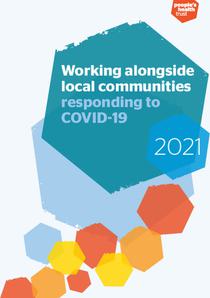Report overview
Between March and April 2021 we surveyed our Active Communities and Local Conversations funded partners to understand how the Covid-19 pandemic had impacted neighbourhoods, community workers and the delivery of their projects.
This is the third wave of research, following surveys undertaken in March-April 2020 and August-September 2020.
Our funded partners work within communities and neighbourhoods experiencing the highest levels of disadvantage and this survey helps us to understand in what way existing disadvantages and operational difficulties have changed.
We know that people living in the most disadvantaged neighbourhoods, disabled people, people with learning disabilities, and minoritised ethnic groups (particularly people of Bangladeshi and Pakistani ethnic backgrounds) experienced disproportionate impacts of the pandemic.
In the survey our funded partners highlighted multiple issues impacting these communities and the wider neighbourhoods where they work. Financial insecurity, food insecurity and mental health were some of the main concerns highlighted within the communities we fund.
Whilst the pandemic has been hugely challenging for community organisations, this report also found greater engagement with communities and partnerships with local organisations. In many cases there was an increased demand on community organisations, the impacts of which are explored in this report.
[The] groups most affected are those who already have mental health challenges. This has also been a problem for the leaders of our group who have found that the added pressure of current mental health issues and working on the front line for Covid health delivery have been really stressful.
Project lead

Key findings
- 41 per cent of funded partners were still engaged in providing emergency food packs;
- Two-thirds (66%) of the Trust’s funded partners reported that residents were experiencing more financial concerns as a result of the pandemic
- 97 per cent of project leads identified mental health as a concern within their communities and neighbourhoods.
Date published: 15 October 2021

Download
Read the report on the impact of the pandemic on communities experiencing disadvantage here.
Download